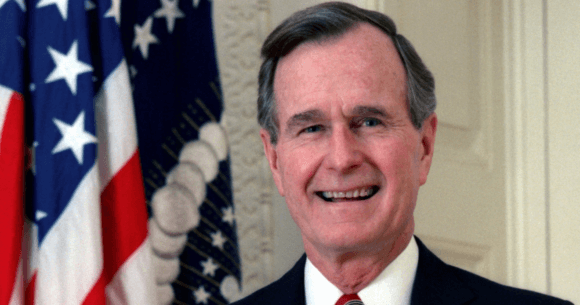The American press’s obsequies for George H.W. Bush as a supposedly great one-term president have left out an important question: Did his opposition to Israeli settlements cost him a second term in 1992? A number of analysts have suggested as much over the years. And while the evidence is hardly slam-dunk, there is no question that taking on the Israel lobby hurt the president.
Bush openly opposed Israeli Prime Minister Yitzhak Shamir over billions in U.S. loan guarantees that would be used to build illegal settlements in 1991. In doing so, he stated the American people would be behind him; but he violated the core principle of the Israel lobby, There must never be daylight between the White House and the Israeli government.
And Bush famously took on the lobby. During the battle, the president uttered his famous line, “there are 1,000 lobbyists up on the Hill today lobbying Congress for loan guarantees for Israel and I’m one lonely little guy down here asking Congress to delay its consideration of loan guarantees for 120 days.”
As the Times of Israel pointed out: “The notion of the president — leader of the world’s only super power — as ‘one lonely little guy’ going up against the pro-Israel lobby has become a staple of the narrative that Israel backers wield excessive power in the American political system.”
Bush won the battle: Israel had to put a slight curb on settlements for a short period. Israelis blamed Shamir for overplaying his hand with the U.S., and voted him out in 1992, The Washington Post’s Glenn Frankel wrote. But Frankel assessed that Bush also “paid a price” for his decision to cast the Israel lobby as counter to U.S. interests.
“[The standoff] clobbered the Jewish community, left us in a state of shock,” one American Jewish leader told me later…
Bush paid a price… He got crushed in a small group of heavily Jewish precincts in states such as New York, New Jersey, Ohio and Florida in his November 1992 election loss to Bill Clinton.
Bear in mind: Bill Clinton ran to Bush’s right on Israel, supporting the settlements, and took the White House.
The argument that the issue turned the election is not convincing by the overall numbers. Clinton won by a resounding electoral margin, 370 to 168, and Bush’s gaining N.Y., N.J. and Ohio (two of which he’d won by big margins in ’88) wouldn’t have changed the outcome. But the Jewish vote cratered for Bush, and so presumably did Jewish donors. He had won 27 percent of the Jewish vote in ’88, only 15 percent in ’92.
Just as Jimmy Carter was said to believe that his stance on Israel cost him a second term, it is said that Bush held a similar belief. “Many believe that George H.W. Bush’s defeat in 1992 was the result of Jewish-American opposition fueled by his hard line against Israeli settlements under the Shamir government,” Michael Desch, the political scientist, wrote. His footnoted evidence includes informal comments to students by the former President himself, in a visit to the Bush School of Government and Public Service at Texas A&M in February 2005, a visit at which Bush decried the power of AIPAC (the preeminent pro-Israel lobby).
Tom Friedman also said (not in the Times, but on an Al Jazeera broadcast), that the lonely lobbyist moment all but cost Bush the presidency and pulled American politics, including Bush’s son George W. Bush, to the right.
[A]s you know, President Bush the first stood outside the White House one day and said I’m one lonely man standing up against the Israel lobby. What happened as a result of that… is that Republicans post Bush I, and manifested most in his son Bush 2, took a strategic decision, they will never be out pro-Israel’d again. That they believe cost them electorally a lot.
So that pulled the American spectrum to the right. And it created an arms race with the Democrats, over who could be more pro Israel.
This brings up the neocons and the Iraq War disaster of Bush the Second– again, something the press has ignored in honoring George H.W. Bush. The neocons were devoted to Israel’s security, and helping Israel was an important driver of that war. Thankfully, NYT columnist Maureen Dowd, who had a long correspondence with the late president, insisted on talking about the late president’s passivity, and his son’s Iraq folly, during broadcasts yesterday. She said that George W. Bush went against his father’s implicit counsel on Iraq, and “ruined” his presidency.
Here’s Dowd on PBS News Hour last night:
[I]t was heartwarming to see W.’s incredible emotion toward his father [in his eulogy], but it was also kind of heartbreaking, because, you know, I have spent decades covering the family. And the father, you know, constantly worried that Dick Cheney and Donald Rumsfeld were leading W. astray on the Iraq War, and the neocons were leading him astray. And I think W. didn’t want to seek his father’s advice or hear what he had to say about the invasion of Iraq.
And then it took years and years before he came around and realized his father was right, and distanced himself from Rumsfeld and Cheney. But, by that time, it was too late. It was the worst mistake in American foreign policy.
So, you know, to see all that emotion, you just wish that, you know, they had been more mentor and protege during the time when he needed it.
Dowd said a similar thing on MSNBC. The late Bush believed that the neocons “hijacked” George W. Bush’s presidency.
“I think he agreed with my analysis of the Iraq War, that it was a mistake to go into Baghdad and trump up this reason for war because he had decided not to do that,” Dowd said on MSNBC’s “Morning Joe.”
“But he couldn’t say that, except to his closest friends,” she added.
Dowd said that the former president, who died Friday at the age of 94, often sent notes to her over the years as the two developed a close relationship.
She added that the elder Bush also believed that the presidency of his son, George W. Bush, was “hijacked” by neoconservatives.
“He also agreed with me that Dick Cheney and Donald Rumsfeld and the neocons hijacked W’s presidency,” she said. “And finally in the end he told that to Jon Meacham. He said they … had sort of ruined his son’s presidency.”
Cheney was George W. Bush’s vice president and Rumsfeld was his Defense secretary from 2001 to 2006.
Of course discussing these issues in any depth would involve addressing the power of the Israel lobby in U.S. politics. The press doesn’t like to do that because any discussion of Zionist influence is thought to be anti-Semitic. But that failure only empowers the lobby– which loses when it is called out openly, as it lost in 91 to Bush– and because the influence is so obvious that the silence fuels anti-Semitic conspiracy theory, about the lobby controlling foreign policy and the press.



Well, we’ll get to watch an Irish version of this unfold.
I just noticed the Irish Senate has voted to outlaw all occupied territory products.
Growing up in a staunchly union democratic household, i never voted for Bush I, but history should treat him well, given what came after. read the National Security Archives and in a few pages you can see the evolution of Russia-US relations leading to the sorry state of affairs of the moment. *spoiler alert* Bush/Baker good; Clinton/Christopher bad.
https://nsarchive.gwu.edu/briefing-book/russia-programs/2017-12-12/nato-expansion-what-gorbachev-heard-western-leaders-early
https://nsarchive.gwu.edu/briefing-book/russia-programs/2018-03-16/nato-expansion-what-yeltsin-heard
there’s been so much written about Bush I’s loss to Clinton, the causes aren’t entirely clear. Some sum it up by blaming Perot, but others insist if you wade into the details, the demographics state-by-state, Perot’s impact was de minimus. Conspiratorial as i am, i couldn’t help but feel something suspicious was afoot after viewing Bush’s projectile vomiting episode in early ’92 in Japan.
RE: “Many believe that George H.W. Bush’s defeat in 1992 was the result of Jewish-American opposition fueled by his hard line against Israeli settlements under the Shamir government,” Michael Desch, the political scientist, wrote. His footnoted evidence includes informal comments to students by the former President himself, in a visit to the Bush School of Government and Public Service at Texas A&M in February 2005, a visit at which Bush decried the power of AIPAC (the preeminent pro-Israel lobby). ~ Weiss
SEE: “The Film the Israel Lobby Does Not Want You to See” | by
Chris Hedges | truthdig.com | Dec. 03, 2018
ENTIRE ARTICLE – https://www.truthdig.com/articles/the-film-the-israel-lobby-does-not-want-you-to-see/
First John McCain, now George H. W. Bush. Liberals heaping praise on warmongers. Such is the sorry state we find ourselves in.
The fact that Bush and Carter attributed their losses to bucking the lobby is significant.
If we focus on the next Democratic president and plan to support him/her/them in an effort to change the direction of US foreign policy regarding Israel Palestine to the degree that they succeed in accomplishing a peace, then the Lobby will be a formidable enemy/opponent in that effort.
The Lobby supports the Israeli government, except when it doesn’t. Such as when Rabin and Ehud Barak tried to make peace, the Lobby really wasn’t behind them, the lobby’s attitude does not have the changing of the guard that a Labor prime minister taking over from Likud entails, the lobby is not elected and cannot change that quickly. it’s the same people who supported likud and they do not change on a dime. there needs to be a prolonged sustained governmental change before the lobby’s attitude could reflect it in a new attitude. so the lobby was more tied to likud than it was to the changing of the guard implied by the premiership of Rabin and Barak.
But assume that the next president is bernie sanders, just to pick an example. His ability to raise funds on line gives him an independence that is not found elsewhere in politics today. First, please realize: he will frame his goal as a two state goal. Second: the lobby will try to defeat him in this effort.
(It seems that Obama would have been willing to go full court press against Netanyahu, if only the Democratic party wasn’t hurting for funds. Given the advantage that republicans have in the electoral college (meaning that it does not reflect the population of the big cities, but rather we are not a nation where the people decide, but nation where the states decide) and the senate (with its advantage to the empty white states in the west), so the ability to navigate foreign policy according to his own vision could be as limited as Obama’s despite his ability to raise funds in a presidential campaign.)
In Israel No changing of the guard is coming soon.
Netanyahu will not be in power forever, but there is every reason to assume the continued prominence of the Likud and the right wing. (The vulnerable point in the right wing coalition is in fact the Haredi ultra Orthodox, whose constituency is hardcore right wing, but whose leadership is devoted to issues other than security, and therefore theoretically able to switch sides if some Talmudic expert decides that the policy being proposed fits his own concept of practicality.)
People who support Israel (as conceived previously) but oppose the Israel that has developed will have a tough time undercutting Israel on behalf of Bernie sanders trying to pressure israel. Young ‘uns who do not have a history of supporting Israel will not be as difficult to persuade, but the lobby will probably be quite robust in its fight against the bernie sanders peace campaign.